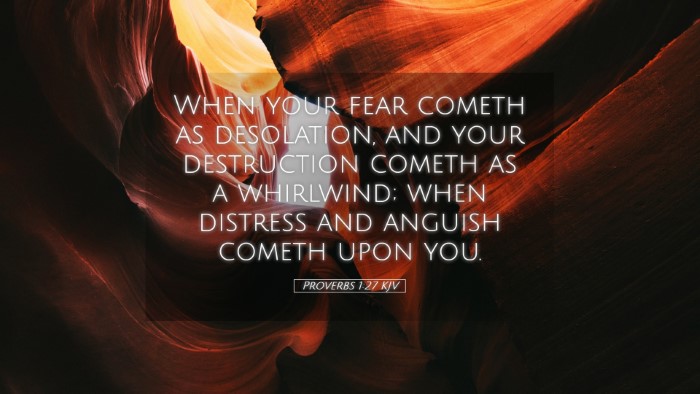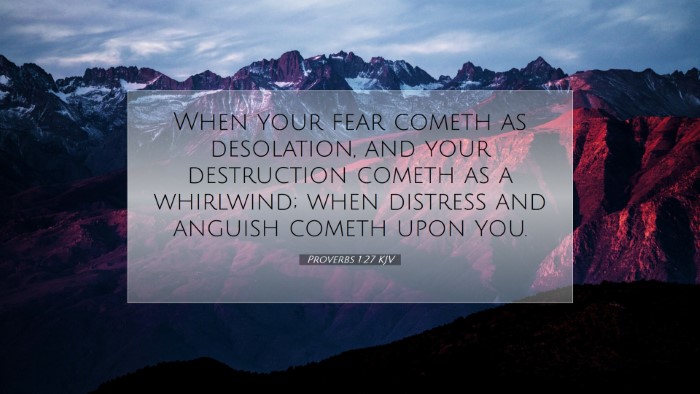Commentary on Proverbs 1:27
Verse Overview:
Proverbs 1:27 states, "When your dread comes as a storm, and your calamity comes as a whirlwind, when distress and anguish come upon you." This verse serves as a poignant reminder of the consequences of rejection towards wisdom and godly instruction.
Interpretation and Analysis
This verse can be understood in the context of both immediate and extended consequences of ignoring divine wisdom. The imagery of a storm represents sudden and overwhelming danger that often takes individuals by surprise. In light of public domain commentaries, various theologians shed light on this significant scripture.
Matthew Henry's Perspective
Henry emphasizes the inevitability of consequences when wisdom is disregarded. He notes that those who laugh at wisdom will eventually face overwhelming calamity. The "dread" and "calamity" serve as tools of divine correction, meant to bring the wayward back to a state of humility and dependence on God.
- Judgment of God: According to Henry, the storms symbolize God's judgment that will come upon those who persist in their folly. The anguish they experience is a natural result of their choices, reflecting the need to recognize Godly wisdom.
- Call to Repentance: The idea of ‘calamity’ invokes a call to repentance. Henry highlights that experiencing such turmoil may lead individuals back to their senses, prompting a humble acknowledgment of their need for divine guidance.
- Hope for Restoration: While the verse speaks of impending calamity, Henry suggests that this is not the end. There remains a path back to wisdom, emphasizing God's mercy in times of trial.
Albert Barnes' Commentary
Barnes expands on the metaphor of storms and whirlwinds, indicating that they represent uncontrollable forces that often engulf individuals who reject wisdom. He further relates these images to the ultimate end of those who live in disregard of divine instruction.
- Nature of Calamity: Barnes notes that calamity can take many forms, from personal loss to societal chaos. The unpredictability of their arrival reinforces the urgent need for vigilance against foolishness.
- Distress and Anguish: He elaborates that distress may not only impact individuals physically but also spiritually and emotionally, showcasing the comprehensive nature of folly's consequences. Proper understanding of this knowledge could lead one to seek wisdom earnestly.
- Recognition of Temporal Existence: Barnes also infers that the trials individuals face are temporary compared to the eternal weight of glory that comes from adhering to wisdom's call.
Adam Clarke's Viewpoint
Clarke approaches the verse from a historical and practical perspective. He outlines the significance of fearing the Lord and the ramifications of failing to heed that fear.
- Fear as an Instructional Tool: Clarke posits that fear can serve as an effective teacher. Through the experiences of calamity, individuals may gain wisdom that eluded them during times of safety and comfort.
- Storms of Life: He draws parallels between literal storms and life's overwhelming trials, urging believers to find strength in faith during turbulent periods.
- Emotional Consequences: Clarke emphasizes the emotional aspect of distress, noting that it can lead to a spiritual reckoning, sparking a desire for reconciliation with God.
Theological Implications
When considering Proverbs 1:27, it is crucial to explore the theological implications that arise from this scripture. The theme centers around human agency, divine sovereignty, and the moral order established by God.
Human Agency and Accountability
Believers are endowed with the freedom to choose between wisdom and folly, underscoring the responsibility each individual has in their spiritual walk. The warnings embedded in this verse serve not merely as threats, but as an expression of God's love, directing humanity back to Himself.
Divine Sovereignty
The calamity described in this verse displays God's authority over all creation, including the forces of nature that symbolize life's trials. It illustrates that while calamity can arise from human folly, it remains under the sovereign control of God, who uses these trials for His purposes.
Moral Order
God’s moral order is illustrated through the consequences of folly. Proverbs, like the one at hand, serves as a reminder that positive choices lead to blessings, whereas poor judgment leads to suffering. Recognizing this principle can empower individuals to pursue wisdom earnestly.
Practical Application
As pastors, students, and theologians engage with Proverbs 1:27, the verse serves as a pivotal point for teaching and reflection.
- Encouragement to Seek Wisdom: It serves as an exhortation to actively pursue wisdom and cultivate a reverent fear of the Lord.
- Teaching about Consequences: This verse can illustrate the importance of making wise decisions, helping congregations understand the spiritual and practical consequences of their actions.
- Promoting Repentance and Restoration: Highlighting the merciful aspect of God’s correction can encourage believers to seek restoration, even after straying from wisdom.
Conclusion
Proverbs 1:27 offers profound insights into the nature of human folly, divine sovereignty, and the corrective nature of suffering. Through the combined wisdom of Matthew Henry, Albert Barnes, and Adam Clarke, we garner a holistic understanding that pushes us towards a deeper commitment to seeking wisdom and recognizing the grace available even amid turmoil. It challenges us to enable a culture that values godliness over folly, encouraging transformative relationships with God.


